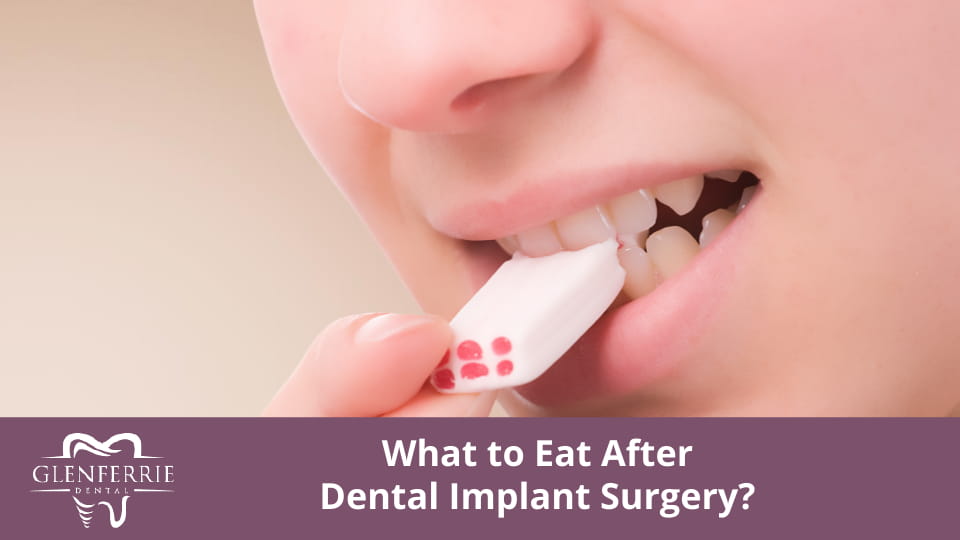Dental implant surgery is relatively invasive, so you must take certain precautions right after the surgery.
Once your implants fully integrate with your jawbone, you’ll return to eating all your favourite foods. However, your dentist will instruct you what to do and what not to do right after the procedure.
Glenferrie Dental is committed to getting patients their dream smile and will happily guide you on eating after the dental implant surgery.
How Long After Dental Implants Can I Eat Normally?
It is no surprise that your mouth will be a little tender right after the surgery. This means you are going to watch what you eat for a while.
Most patients return to eating relatively firm foods about a week after the surgery. You may still be unable to chew hard, and chewy foods like nuts, but a reasonably solid diet is feasible.
Sometimes, fast-healing patients can return to a solid diet about 24 to 48 hours after the surgery. You must ensure that the diet consists of foods you can easily chew, such as beans or ground beef.
How Can I Make My Implant Heal Faster?
The healing period for dental implants varies from patient to patient. Below are some of Glenferrie Dental’s tips for a speedy recovery after implant placement.
Rest
You should avoid disturbing the surgical site after your dental implant surgery. This means always resting with your head elevated on a pillow. It is essential in the first few days after the surgery.
Still, we recommend you continue to avoid strenuous activity, even when you feel better.
Use Icepacks
Swelling is expected after your surgery, although it is more severe for some patients. You can use a cold compress, such as an icepack, to alleviate the swelling.
Make sure the cold compress is wrapped in a towel and only use it for 15-20 minutes at a time. If not, you can risk getting an ice burn on your cheek.
Use A Hot Compress
After about three days, an ice pack won’t do much to reduce swelling. So, you’ll want to switch to a cold compress at this time—that is, if swelling persists.
Apply the hot compress in the same manner as the cold compress: for 20 minutes on and off throughout the day.
Stay Hydrated
You must stay hydrated after your dental implant surgery. The water helps flush out toxins that may have hindered your recovery process.
It would be best to avoid alcohol and caffeine, as they can dehydrate the body. Alcohol can also affect the healing process, so you should avoid it for at least two weeks after the surgery.
Make sure not to drink through a straw, as it could pressure your mouth, and you don’t want that.
Rinse With Salt Water
Your dentist may recommend saltwater rinses for the first few days after your surgery. The saltwater rinse works to eliminate bacteria in your mouth and can be quite soothing as well.
You can use the rinse up to four times a day or as instructed by your dentist. Alternatively, they may also advise you to use an antimicrobial mouthwash.
Avoid Smoking
Smoking can hinder your healing process following implant surgery. This is because nicotine restricts blood flow to the bone, contributing to delayed healing.
Some studies show smokers have a higher chance of dental implant failure than non-smokers. Smoking inhibits osseointegration after your dentist has placed your dental implants.
Practice Good Oral Hygiene
Dental implants are artificial teeth; however, you’ll still have to care for them to ensure their success. Tham means brushing twice daily and flossing at least once.
Your oral care routine may change as you progress through the recovery process. Continue to follow your dentist’s instructions, and you’ll be on your way to complete healing in no time.

What To Eat After Dental Implant
Your dentist should tell you what to eat after your dental implant surgery. Your diet will typically consist of soft and perhaps cold foods in the first 24 hours after the operation.
This diet aims to avoid disturbing the surgical site. In a few months, you’ll be back to eating all your best foods, but for now, stick to eating the following:
- Soft Fruits
- Oatmeal
- Eggs
- Yogurt, Milk & Cheese
- Mashed Potatoes
- Soups
What To Avoid Eating After Dental Implant Surgery?
There are certain foods you’ll need to avoid in the first few months after your surgery. This is because the more you move your jaws when chewing, the higher the risk at the surgical site.
To shorten your healing time, you’ll have to avoid the following foods:
- Hard Foods
- Crunchy Hard Foods
- Chewy Foods
- Highly Acidic Foods
- Spicy Foods
- Sticky Foods
FAQs
How Long After A Dental Implant Can I Eat Normal Food?
You should be able to eat relatively solid food about a week after your procedure. In comparison, it can take up to six months to return to your hard and crunchy diet.
What Can You Eat And Drink After Implant Surgery?
You can eat soft and cold foods like ice cream or yogurt right after surgery.
Can I Eat Warm Food After Dental Implant?
You\’ll have to wait at least 24 hours after your surgery before adding warm foods to your diet.
What Not To Do After Getting Dental Implants?
Avoid strenuous activity and putting pressure on your mouth just after your procedure. Your dentist will give you aftercare instructions on what not to do.
Can I Drink Water After a Dental Implant?
Yes, drinking water after your surgery is quite important, as it can help with the healing process and won’t disturb your stitches.
Can I Drink Milk After Dental Implant Surgery?
Your dentist may advise avoiding milk for some days. But afterwards, you can return to any dairy product of your choice.
How Long Does Pain Last After Dental Implants?
Dental implant pain typically lasts 3 to 4 days after the surgery; if it persists, contact our dental office immediately.
Conclusion
There are some eating restrictions that you have to follow for a while after your implant placement. After that, you can go back to eating some delicious popcorn or nuts.
These restrictions increase your chances of implant success. If you have any concerns about your diet after dental implant surgery, call Glenferrie Dental in Melbourne to schedule a consultation today.
